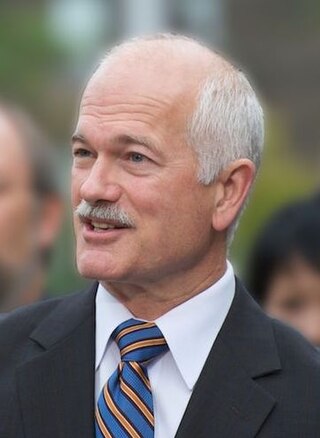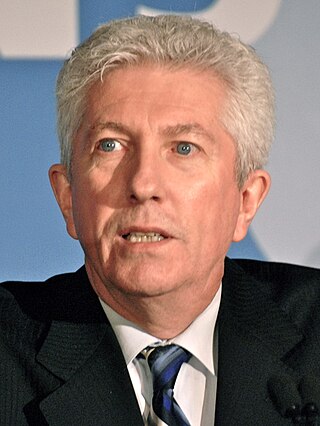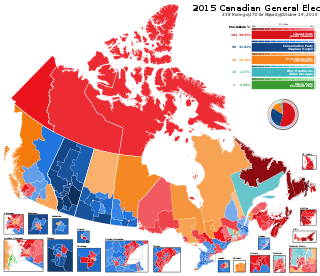
The Bloc Québécois is a federal political party in Canada devoted to Quebec nationalism and the promotion of Quebec sovereignty. The Bloc was formed by Members of Parliament (MPs) who defected from the federal Progressive Conservative Party and Liberal Party during the collapse of the Meech Lake Accord. Founder Lucien Bouchard had been a cabinet minister in the federal Progressive Conservative government of Brian Mulroney.

John Gilbert Layton was a Canadian academic and politician who served as the leader of the New Democratic Party (NDP) from 2003 to 2011 and leader of the Official Opposition in 2011. He previously sat on Toronto City Council, occasionally holding the title of acting mayor or deputy mayor of Toronto during his tenure as city councillor. Layton was the member of Parliament (MP) for Toronto—Danforth from 2004 until his death.

The Reform Party of Canada was a right-wing populist and conservative federal political party in Canada that existed under that name from 1987 to 2000. Reform was founded as a Western Canada-based protest movement that eventually became a populist conservative party, with strong Christian right influence and social conservative elements. It was initially motivated by the perceived need for democratic reforms and by profound Western Canadian discontent with the Progressive Conservative Party.

Stephen Joseph Harper is a Canadian politician who served as the 22nd prime minister of Canada from 2006 to 2015. Harper is the first and only prime minister to come from the modern-day Conservative Party of Canada, serving as the party's first leader from 2004 to 2015.

The 2000 Canadian federal election was held on November 27, 2000, to elect members to the House of Commons of Canada of the 37th Parliament of Canada. Prime Minister Jean Chrétien's Liberal Party won a third majority government.

Gilles Duceppe is a Canadian retired politician, proponent of the Quebec sovereignty movement and former leader of the Bloc Québécois. He was a Member of Parliament in the House of Commons of Canada for over 20 years and was the leader of the sovereigntist Bloc Québécois for 15 years in three stints: 1996, 1997-2011 and in 2015. He was Leader of the Official Opposition in the Parliament of Canada from March 17, 1997, to June 1, 1997. He resigned as party leader after the 2011 election, in which he lost his own seat to New Democratic Party (NDP) candidate Hélène Laverdière and his party suffered a heavy defeat; however, he returned four years later to lead the party into the 2015 election. After being defeated in his own riding by Laverdière again, he resigned once more.

The 1997 Canadian federal election was held on June 2, 1997, to elect members to the House of Commons of the 36th Parliament of Canada. Prime Minister Jean Chrétien's Liberal Party won a second majority government. The Reform Party replaced the Bloc Québécois as the Official Opposition.

The 2004 Canadian federal election was held on June 28, 2004, to elect members to the House of Commons of Canada of the 38th Parliament of Canada. The Liberal government of Prime Minister Paul Martin lost its majority but was able to continue in office as a minority government after the election. This was the first election contested by the newly amalgamated Conservative Party of Canada, after it was formed by the two right-of-centre parties, the Progressive Conservative Party and the Canadian Alliance.
Negative campaigning is the process of deliberately spreading negative information about someone or something to worsen the public image of the described. A colloquial, and somewhat more derogatory, term for the practice is mudslinging.
The following is a timeline of the Canadian federal election, 2004. More on the election in general is available in the article 2004 Canadian federal election.
In political campaigns, an attack ad is an advertisement designed to wage a personal attack against an opposing candidate or political party in order to gain support for the attacking candidate and attract voters. Attack ads often form part of negative campaigning or smear campaigns, and in large or well-financed campaigns, may be disseminated via mass media.
Louis Plamondon is a Canadian politician who has represented Bécancour—Nicolet—Saurel in the House of Commons since 1984, making him the Dean of the House, the longest-serving current member of the House of Commons.
This article provides the timeline of the 2006 Canadian federal election, which was called on November 29, 2005 when the Governor General dissolved parliament following the government's defeat in a motion of no confidence. The election was held on January 23, 2006.

The 2008 Canadian federal election was held on October 14, 2008, to elect members to the House of Commons of Canada of the 40th Canadian Parliament after the previous parliament had been dissolved by Governor General Michaëlle Jean on September 7, 2008.

Anything But Conservative was a strategic voting campaign trialled by opponents of the Conservative Party of Canada. It was also known as the ABC campaign, or Vote ABC.

On 23 January 2010 there were numerous protests opposing the prorogation of the 40th Canadian Parliament. The prorogation had occurred a month earlier on 30 December 2009 on the constitutional advice of Prime Minister of Canada Stephen Harper and was officially carried out by Governor General Michaëlle Jean. Protests were held in over 60 cities and towns in Canada, and internationally in New York City, San Francisco, Dallas, London, Oman, Brussels, Amsterdam, The Hague and Costa Rica. The protests and rallies attracted approximately 21,000 participants, including many who had joined a group on Facebook, known as the "Canadians Against Proroguing Parliament" (CAPP). At the 23 January rallies in Ottawa and Toronto, Liberal Party leader Michael Ignatieff, New Democratic Party (NDP) leader Jack Layton, Green Party leader Elizabeth May, and Member of Parliament Bob Rae spoke against the prorogation, while at the rally in Montreal, Bloc Québécois leader Gilles Duceppe spoke alongside future NDP leader, Thomas Mulcair, and Liberal MP Marc Garneau. Future Liberal Leader and Prime Minister Justin Trudeau was also in attendance at the Montreal Rally.
This article lists some of the controversies in the 2011 Canadian federal election.

The 2015 Canadian federal election held on October 19, 2015, saw the Liberal Party, led by Justin Trudeau, win 184 seats, allowing it to form a majority government with Trudeau becoming the next prime minister.
The following is a page of endorsements from prominent individuals and organisations made during the 42nd Canadian federal election









